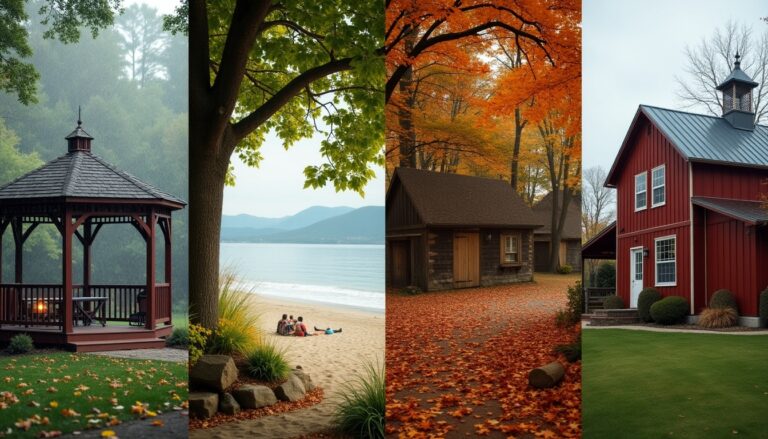Weather can be unpredictable, making backup plans essential for outdoor weddings throughout all four seasons.
Smart couples know that having multiple contingency plans helps reduce stress and ensures a smooth celebration regardless of what Mother Nature brings.
This guide outlines practical backup options and creative solutions for weather challenges in every season.
Spring Wedding Backup Plans
- Book a venue with both indoor and outdoor spaces
- Rent clear sidewall tent panels to block wind and rain
- Provide pashminas or lightweight blankets for guests
- Stock umbrellas in your wedding colors
- Have portable fans ready for unexpected warm days
Summer Weather Solutions
- Set up covered areas or cooling stations
- Offer sunscreen and bug spray stations
- Provide water bottles or refreshment stations
- Have battery-operated fans as backup
- Consider morning or evening ceremony times
Fall Contingency Options
- Rent outdoor heaters for evening temperature drops
- Prepare indoor backup location for rain
- Supply blankets for outdoor ceremonies
- Have clear umbrellas ready for photos
- Consider tent sidewalls for wind protection
Winter Weather Preparation
- Book hotels near venue for guests
- Arrange snow removal services
- Have coat check available
- Supply hand warmers for outdoor photos
- Set up hot beverage stations
Essential Vendor Considerations
Photography: Discuss indoor location options with your photographer for backup shooting locations.
Catering: Ensure your caterer can adapt food service for indoor/outdoor changes.
Rentals: Book tents and equipment early, with clear cancellation policies.
Transportation: Have backup vehicles available for difficult weather conditions.
Insurance and Contracts
- Purchase wedding insurance that covers weather-related changes
- Review all vendor contracts for weather-related cancellation policies
- Get written confirmation of backup plans from your venue
- Document all weather-related contingency plans
Communication Strategy
Create a weather update system for guests through your wedding website or app.
Designate a point person to monitor weather and coordinate with vendors.
Include weather-related details in your wedding timeline.
Smart Planning Tips
| Season | Must-Have Items |
|---|---|
| Spring | Umbrellas, tent sidewalls, portable fans |
| Summer | Cooling stations, shade structures, hydration |
| Fall | Heaters, blankets, wind barriers |
| Winter | Indoor backup space, hand warmers, weather tracking |
Making The Final Call
Set a clear timeline for weather-related decisions, typically 24-48 hours before the event.
Trust your vendor team’s experience with local weather patterns.
Remember that some of the most memorable wedding moments come from unexpected weather changes.
Budget Considerations
Include a weather contingency fund in your overall budget planning.
Allocate 10-15% of your budget for weather-related backup options.
- Emergency tent rentals
- Additional indoor venue deposits
- Weather-specific comfort items
- Last-minute transportation changes
Guest Experience Planning
Comfort Essentials
- Create emergency comfort kits for each season
- Plan for guests with mobility issues
- Prepare clear signage for last-minute venue changes
Communication Tools
- Set up mass text messaging system
- Create weather-specific FAQ section on wedding website
- Prepare venue map with alternative locations
Timeline Flexibility
Build buffer time into your schedule for weather delays.
Create multiple versions of your timeline based on different weather scenarios.
- Plan B photo session locations and times
- Alternative ceremony start times
- Flexible cocktail hour arrangements
Creating Weather-Ready Memories
Weather challenges often create unique and memorable wedding moments that couples treasure for years to come.
Focus on celebrating your special day regardless of the conditions, knowing you’ve prepared for every possibility.
Remember that your positive attitude about weather changes will set the tone for your guests’ experience.
- Keep perspective on what truly matters
- Embrace unexpected moments
- Trust in your backup plans
- Enjoy your celebration, rain or shine
FAQs
- What are the key elements to include in a winter weather backup plan?
Heat lamps, tent sidewalls, blankets or pashminas for guests, covered walkways, and an indoor venue on standby within close proximity to your outdoor location. - How far in advance should I book an indoor backup venue?
Book your backup venue at least 6-8 months in advance, as indoor spaces fill quickly, especially during peak wedding season and inclement weather months. - What’s the best way to handle summer heat during an outdoor ceremony?
Provide shaded areas, cooling stations with fans, cold water stations, handheld fans, and schedule the ceremony during cooler hours (morning or late afternoon). - When should I make the final call to move to my backup location?
Make the decision 24-48 hours before the event, based on reliable weather forecasts and vendor setup requirements. - How do I communicate weather-related changes to my guests?
Use a wedding website, mass text service, or designated point person to inform guests, and include backup plan details in your invitations. - What insurance coverage should I have for weather-related issues?
Secure event insurance that specifically covers weather-related cancellations, postponements, and venue changes. - How do I protect my spring wedding from rain?
Rent clear-top tents, provide umbrellas, install temporary flooring or platforms, and ensure proper drainage at your venue location. - What should be included in a fall weather contingency plan?
Portable heaters, wind barriers, covered areas for food and guests, and plans for early sunset timing. - How do I adjust my timeline if weather affects my photography schedule?
Plan buffer time in your schedule, identify indoor photo locations, and discuss backup lighting options with your photographer. - What vendors need to be involved in the backup plan discussion?
All key vendors including venue, caterer, rentals, photographer, florist, and coordinator need to be aware and prepared for weather contingencies.








